Mote Marine Laboratory scientists conduct world-class research to expand and ultimately transform our understanding of the ocean – the life-support system that provides essential oxygen, food, medicines and enhanced quality of life for communities worldwide.
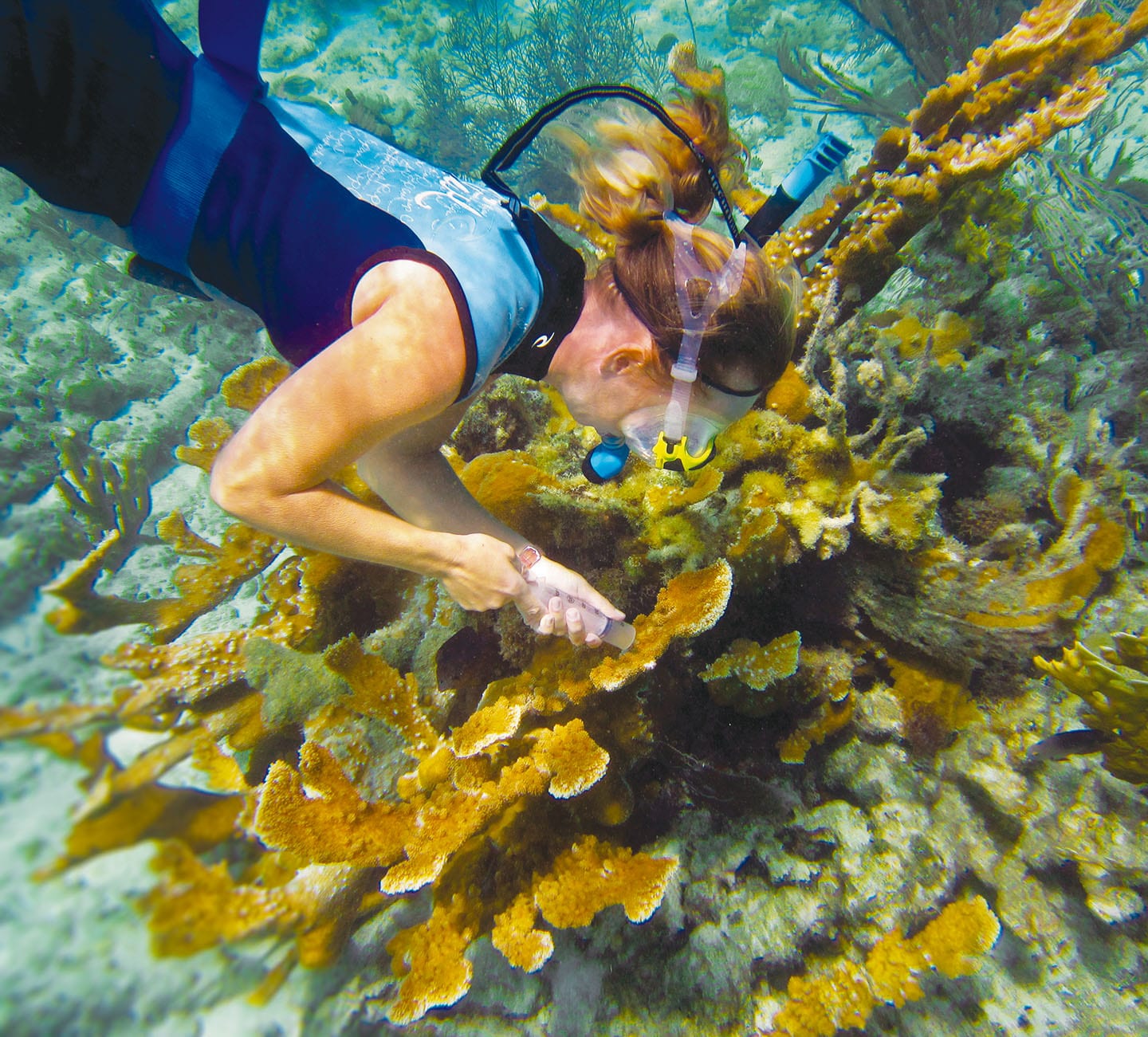
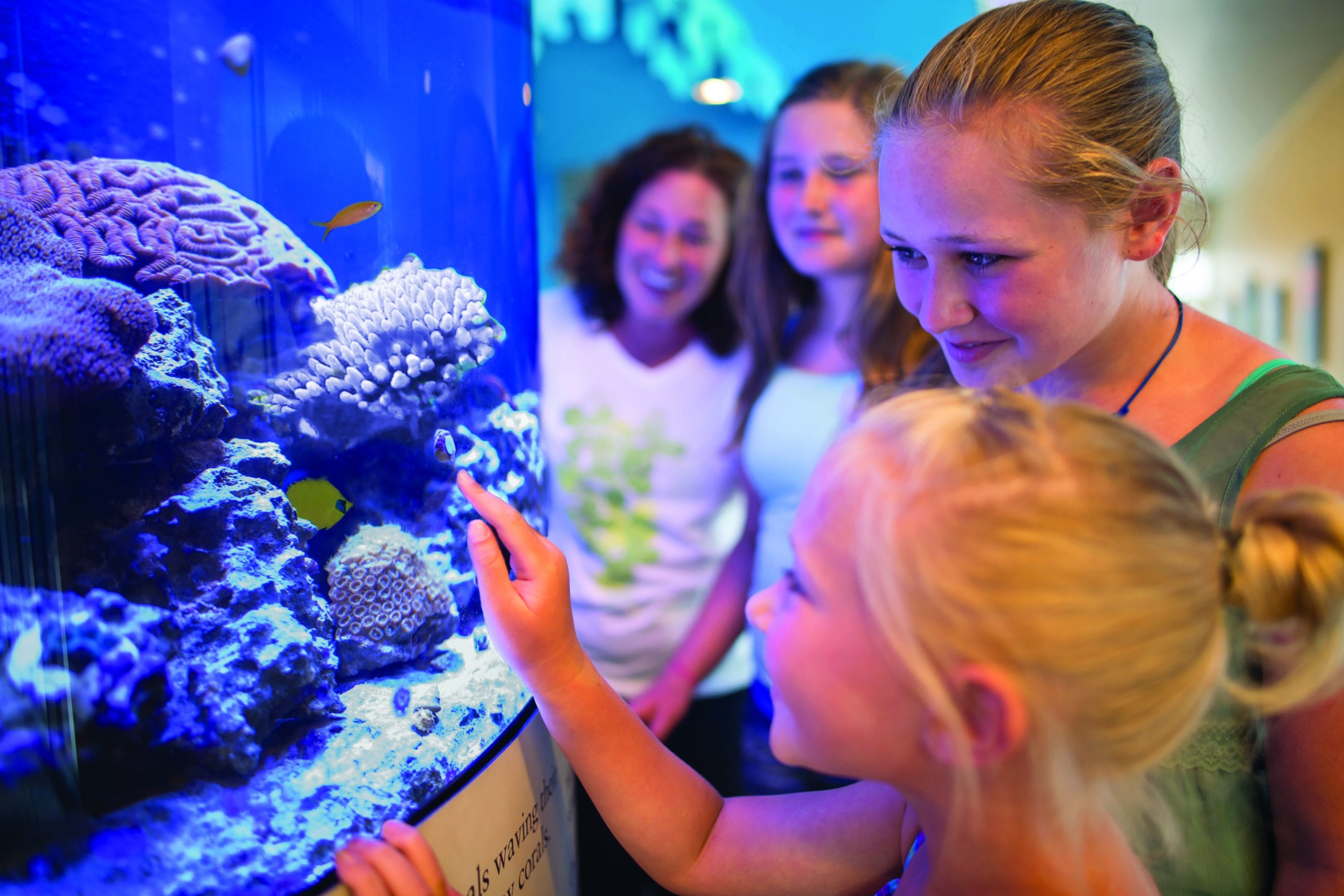
Mote scientists work in the waters around all seven continents, leading more than 20 diverse research programs based at Florida campuses from Sarasota to the Keys. They are investigating new cancer- and infection-fighting substances from the sea; finding innovative ways to restore, in our lifetime, dwindling coral reefs – the ocean’s “rainforests”; elucidating and mitigating the impacts of climate change, ocean acidification and major oil spills; educating the public on conservation techniques and marine science; developing new technology and expanding vital ocean observing efforts; uncovering threats to sharks, sea turtles, marine mammals and other imperiled wildlife; seeking new ways to sustain fisheries while boosting sustainable seafood farming; and much more.
With more than 30 Ph.D. scientists in its staff of more than 200, Mote has intellectual power comparable to many colleges of marine science, but the Lab stands out as an independent, 501(c)3 nonprofit institution. Independence allows Mote to respond quickly to emerging environmental challenges, think outside the box to find innovative solutions and prioritize its research to do maximum good. Mote is able to maintain this important independence through the generosity of philanthropic supporters.
The Lab’s guiding “roadmap,” the 2020 Vision & Strategic Plan, emphasizes studying the sea to support conservation and sustainable use of marine and coastal biodiversity, healthy habitats and natural resources. It also lays out goals for translating and transferring research to benefit the oceans and human society.
Mote shares its discoveries through intellectual property products, with around a dozen patents obtained and several more pending. Mote-patented technology helps detect wastewater contamination, monitor for red tides that can severely affect Florida communities, enable sustainable seafood farming and more.
Mote’s estimated economic impact is $86.8 million in Florida. The Lab’s research helps to fuel the marine-driven “Blue Economy,” which is critical: Ocean-related activity contributed $17.5 billion to Florida’s gross domestic product as of 2010. The fishing, ecotourism and aquaculture industries, and rising powers like marine biomedical research, are critical to a healthy economy.
The Lab’s most priceless gift is shared knowledge. Mote provides independent, science-based information and expertise for policymakers, resource managers and other decision makers. Mote scientists also exchange knowledge with fishers and others who value marine resources; the Lab conducts inclusive workshops and leads citizen-science projects such coral-restoration and monitoring efforts with the help of volunteers.
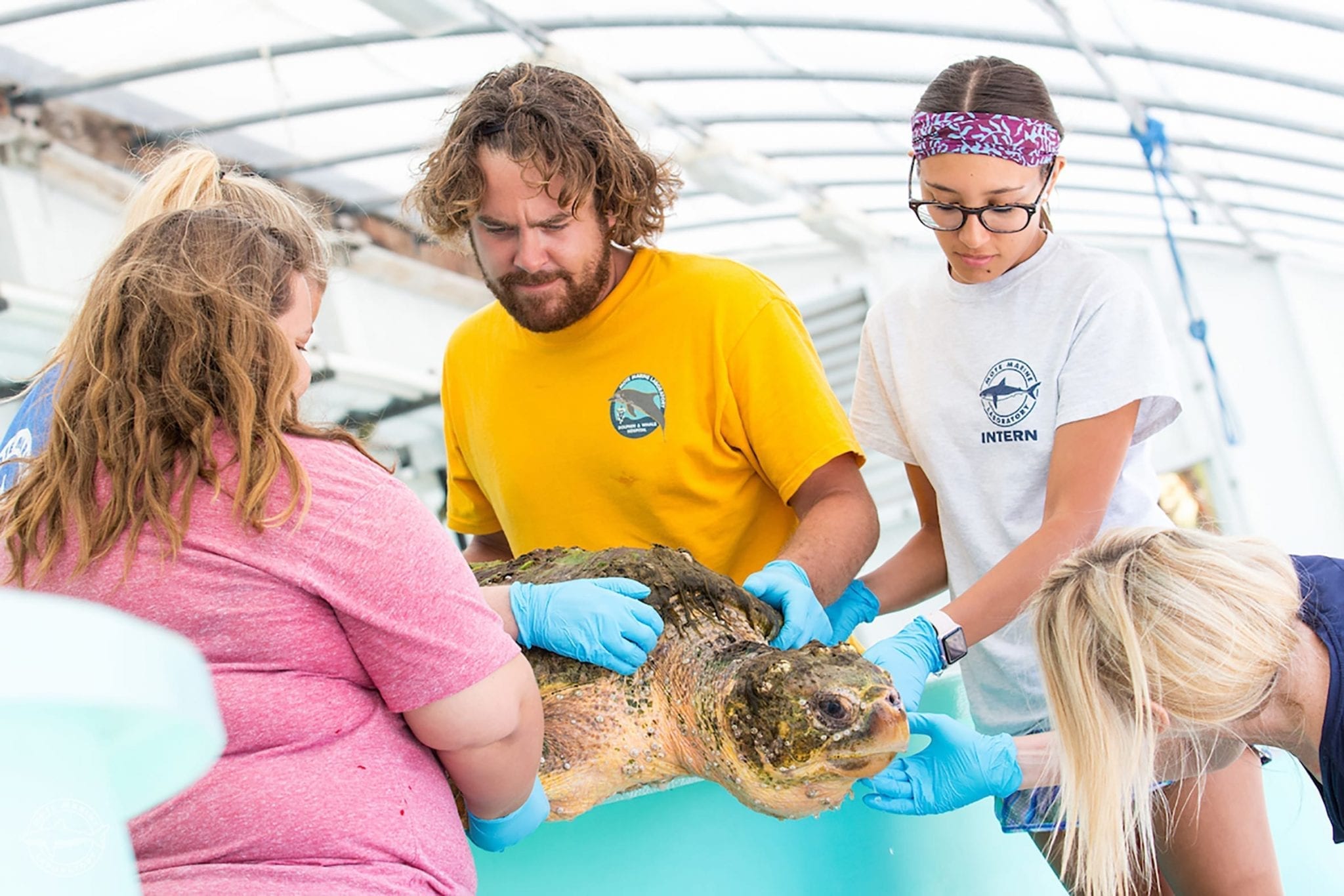
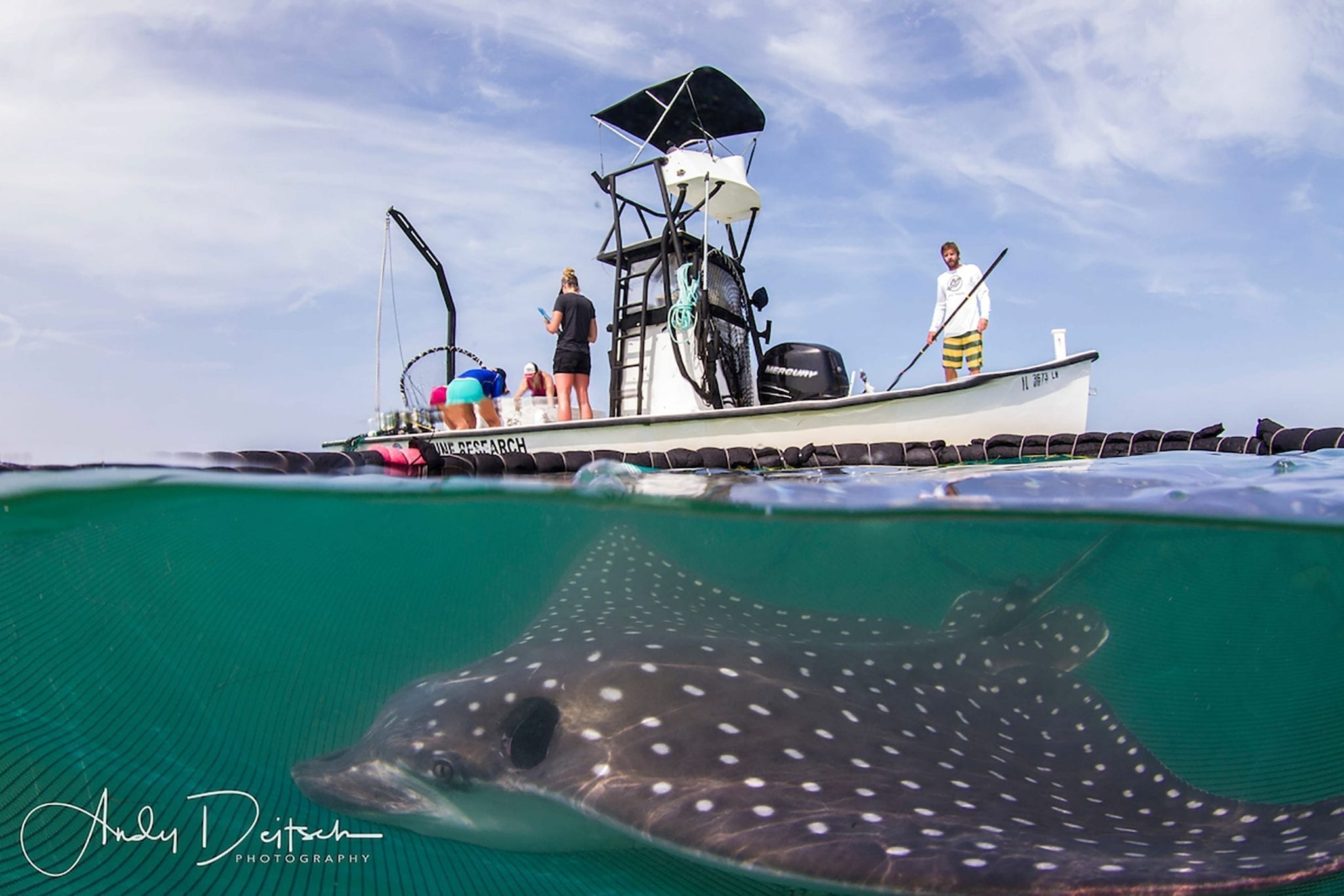
Recent research highlights:
- In May 2017, Mote opened its new Elizabeth Moore International Center for Coral Reef Research & Restoration at its existing Summerland Key campus. The facility emphasizes research on the challenges facing Earth’s coral reefs and the scientific solutions for restoring reefs in this lifetime — including identifying and selectively restoring genetic strains of coral resilient to challenges such as warming water temperature, ocean acidification and coral disease.
- Since the early days of the Deepwater Horizon oil spill, which began April 20, 2010, Mote has played a significant role in research investigating how oil exposure can affect marine life during and after a spill. Currently, Mote scientists are working toward developing rapid health-diagnostic tests based on sub-lethal responses that will better predict short- and long-term impacts of oil exposure in the Gulf of Mexico fish. Mote Senior Scientist Dr. Dana Wetzel is Toxicology Task Lead in the Deepwater Horizon research consortium CIMAGE II (and its predecessor, C-IMAGE), which is based at the University of South Florida, which has St. Petersburg and Tampa campuses.
- The toxic Florida red tide algae, Karenia brevis, affects people and wildlife and can cost Florida’s economy millions of dollars. Mote scientists are working to take red tide research and response efforts to new levels. Their current work includes: developing new tools to better detect the red tide toxins that can affect wildlife and people; expanding knowledge about red tide impacts on shellfish to protect public health; developing new smartphone apps to significantly improve the reporting of red tide impacts and help the public choose the best beach on a given day; exploring the possible uses of drones (unmanned aerial vehicles) for better detection of red tide; and more.
- Mote has hosted three lionfish derbies – competitive events where divers remove this harmful invasive fish, Mote scientists study its impact and the public learns how to fight the invasion, while tasting delicious lionfish dishes from local chefs.
- Mote scientists work closely with their communities to study popular sports fish, gaining knowledge to benefit Florida’s $6.5 billion saltwater fishing industry. For example, in 2016 Mote scientists released hundreds of hatchery-reared, ID-tagged juvenile snook into Phillippi Creek in Sarasota County for an ongoing study seeking the most effective methods to replenish and enhance wild snook populations. The researchers worked with creek-side residents to place antenna arrays on residential waterfront property to monitor for the fish, sharing knowledge in the process.
- Mote Aquaculture Research Park in eastern Sarasota County, Mote scientists are studying new ways to clean and re-use fresh and saltwater in closed-loop, recirculating systems, to grow fish for seafood and environmental restoration, sea vegetables and plants for wetlands restoration in ways that sustainably utilize natural resources — especially water. Their goals emphasize environmental and economic benefits. One recent example: Mote’s 2016 research demonstrated that excess mullet from the local Cortez commercial fishery could be used to produce a healthy commercial diet for a farmed, freshwater fish — a major first step toward new income opportunities for west Florida’s heritage mullet fisheries and an important line of research the Lab plans to continue with farmed saltwater fish.
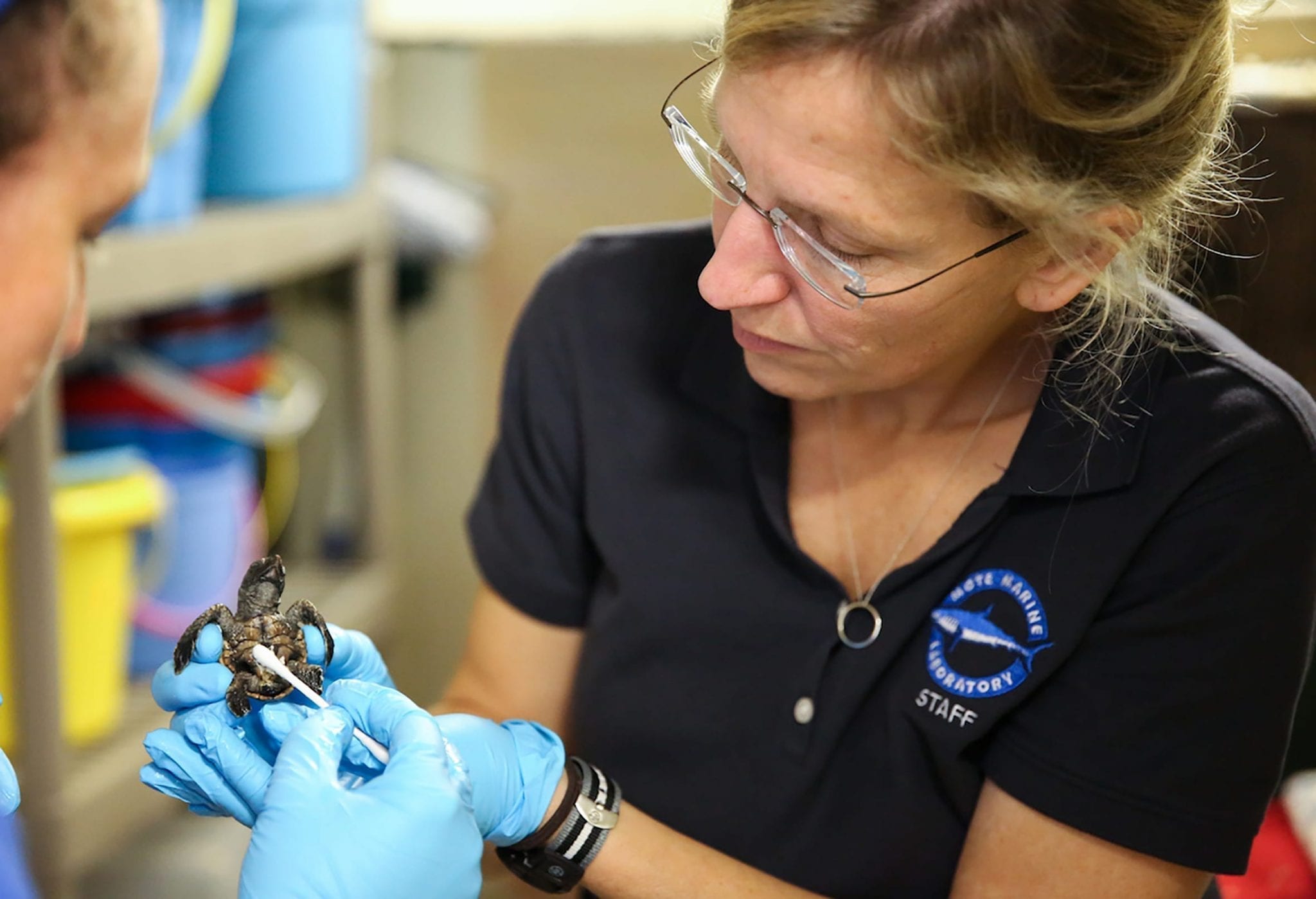
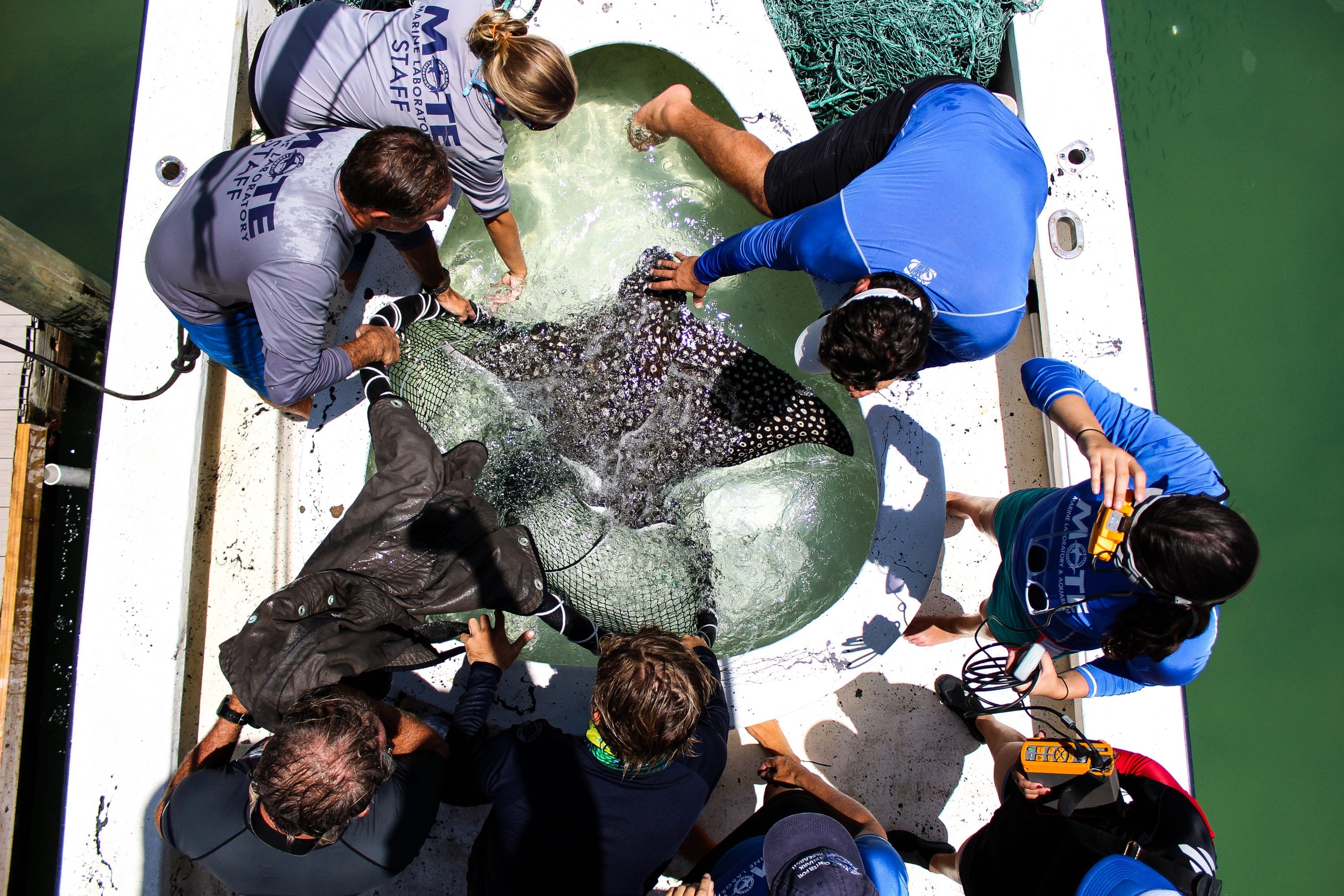
Education and outreach
Mote’s Education, Aquarium & Outreach Division plays a significant role in our effort to translate and transfer science and conservation information to our communities and the world.
We inform and engage hundreds of thousands of people each year through:
- Mote Aquarium, which features more than 100 marine species — from sharks, other fishes and invertebrates to sea turtles and manatees — and highlights the work of Mote scientists;
- Interactive education programs for pre-K children through adults;
- Distance learning efforts involving traveling exhibits and SeaTrek digital learning programs that reach people across the U.S. and beyond;
- Events such as science cafes and an annual lecture series;
- A chapter of the Gills Club geared toward engaging girls in science;
- Conservation-focused fundraisers such as Mote’s annual 5K Run for the Turtles (which recently had its 30th year of raising support for sea turtle conservation and research);
- Policy-oriented briefings and publications. For example, we provided 21 briefings/testimonies to government representatives in 2016.
Mote Aquarium continually introduces new exhibits. Our latest additions, “Otters & Their Waters: Exploring a Florida Ecosystem,” and “The Teeth Beneath: The Wild World of Gators, Crocs & Caimans,” feature North American river otters and several crocodilian species as ambassadors for watersheds, highlighting the connection between watersheds and oceans while providing wildlife- and environment-friendly facts and tips.
More than 1,500 Mote volunteers donate their time as Aquarium docents, trained educational ambassadors, Aquarium, education and scientific program support volunteers and much more.














